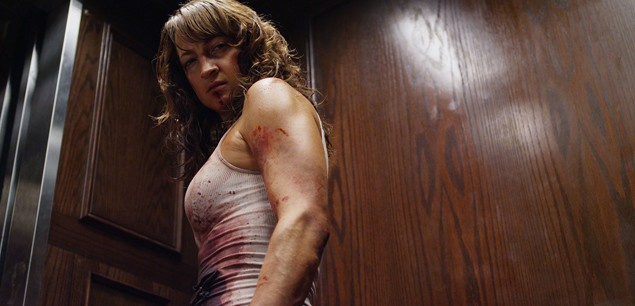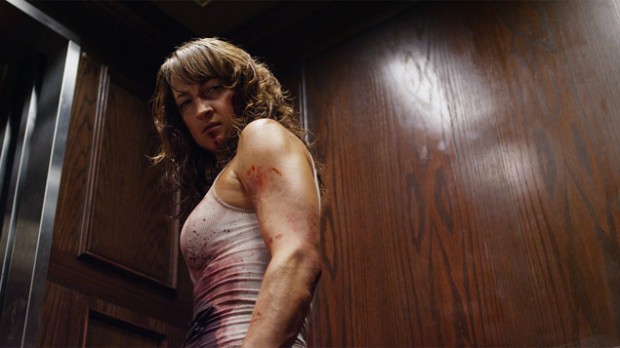
Since the amazing “Ship’s Mast” sequence on the hood of the 1970 Dodge Challenger R/T in Quentin Tarantino’s Death Proof, Zoë Bell has slowly moved from primarily a stunt double in action films and TV shows to becoming a more frequent screen presence in front of the cameras. You might have seen her in last weekend’s Oblivion and her latest film in this endeavor is Raze, a project she came on to produce and star in, which premiered at Tribeca last Sunday in the midnight series.
The film revolves around women that have to fight to the death against other women inside a prison system to save loved ones and themselves. During our discussion, Bell talked about how their aim was to subvert the typical trappings of the women-in-prison genre. You won’t see any bra and panty fights here. There’s a focus on character and highlighting the emotion of what it takes to have these women fight to the death. We also talked about the outfits they wore instead, dealing with her own stunt doubles, balancing reality with energy, why some of her friends were sad she didn’t reach out for help, and writing her own film.
The Film Stage: So, you premiered Sunday night. How’d that go?
Zoë Bell: Well, we’re still waiting on the critical side of it. Still waiting to hear about distribution and reviews. But as far as the public reaction, it was amazing. To be working on something so close and intimate for the last year and a half from conception to premiere. So watching it on Sunday it would almost be impossible for me to view it objectively, but seeing it in a theater with an audience and surround sound, color correction, and all the sound design and amazing soundtrack. It was the first time I got to watch Sabrina as opposed to Zoë watching Zoë work. Having the audience respond to all the areas that we wanted them to respond to, it was amazing. People were laughing when we wanted them to laugh. And you wouldn’t think this is a movie that would get much laughter. It’s not a comedy by any means. [Laughs] To have the audience get behind Sabrina to the point where they were rooting for her and cheering for her out loud, it was just a really satisfying experience. And they had such amazing things to say afterward. It just makes you beam.
One thing I love is the trajectory of your career. How you’ve slowly went from behind the scenes to in front of the camera. But a lot of the stunt people work in that field because of the simple fact that the main actor or star can’t risk getting seriously injured and maybe out of production for 2-3 weeks to recover or have their face messed up. It would seriously derail a small film and even a big one. Do you see that occurring with you now?
Zoe Bell: You mean requiring a stunt double?
Yeah!
Yes. I’d be naive to say no. I don’t really need a stunt double. But if I’m doing something I’m not really good at… I’ve jumped out of planes before and I’ve done that, but I don’t have a license and I’m not a skydiver. So, if I was doing a skydiving movie, I’d want a stunt double because I’d want my character to be as believable as possible. I don’t have ego issues around if I need a stunt double. The insurance side of things is something I couldn’t fight anyways. If I end up being the lead person in a big budget movie, chances are good that insurance companies are going to require me to have a stunt double regardless even if it’s stuff I can do.
I’d probably still like to do all my own stuff and not from a place of ego but I just love doing that stuff. I also like the genuineness of when you can tell it’s the same person all the way through. But I did a movie called Angel of Death a while ago. It was a web series. I had a stunt double. She didn’t do anything…at all. [Laughs]. But we had one standing by because we had a really small schedule. But as a stunt double, as you say, you’re technically replaceable. And because when you’re acting your face is on film so much you’re instantly irreplaceable. Not because anything personal. Not that I’m an irreplaceable individual, but just that my face is now on that film.
Hair pulling is kind of a dirty weapon in these fights, but, it’s an available tool as well. So, when you are setting these fights up, how much do you acknowledge that and include it or do you try to write it out in some way?
We had a lot of conversations about various things, and that was one. But if you see real life women fight, there’s a lot of hair pulling and there’s a lot of scratching and slapping. We did have them in some of the fights and a lot got cut. They didn’t end up in the final edit. But there are some montage fights where there is hair pulling. But we didn’t shy away from that at all because we wanted it to be sort of realistic. But we were limited in time and resources and hair pulling is actually really painful. [Laughs]. So we had a couple of throwing people around and doing that stuff. But fights to the death are a little bit different. You can’t really pull someone’s hair to death. There would have been like an hour fight. [Laughs].
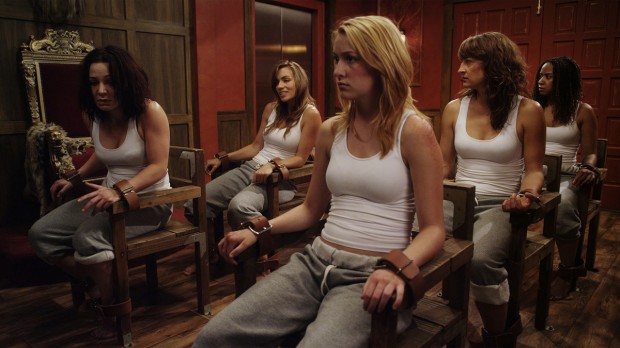
I noticed you had white tops and grey sweats. How much of that was a conscious decision? I saw in one photo of you there was blood all over you and the shirt and it’s a great effect.
That was one of those happy accidents. We decided against dressing in dark colors for that reason. But to be honest, we had a discussion at the beginning of whether these women should be in bras and panties or not. But that was a conversation. I was never a big fan of that because I was going to be the lead. Not to disrespect movies that do that, but we were trying to stay clear of those types of genre movies just because that was the challenge we made to ourselves. We wanted it to be about these women fighting to the death because they have no choice. And trying to get into the emotion of that. The truth is if you were fighting in bras and panties, they would come off. So, we’re not doing that movie. And to be honest, the grey sweats and white tank, from what I can remember, kind of came from me because there’s something kind of old school cool about that to me. They feel kind of timeless and classic. And we didn’t want them in full dojo gear. But we did go with tight pants because then there is less chance of them being ripped off and being used as a weapon. But the first time we got blood on one of the tops we were like, “Oh, shit yeah! That looks awesome.” [Laughs].
You’ve mentioned that after Raze, a lot of friends came up to you kind of disappointed that you didn’t reach out to them for help with the film. Can you be a bit more specific as to what those areas might be?
Yeah, I had some people I had worked with from Quentin’s crews sort of in the lighting department and the DP departments. My whole thing was that we didn’t have the money. We obviously didn’t have the money they would have deserved, because that would have been our whole budget. But when you know someone who’s been working that long and that hard, and has earned the right to earn that kind of money, if I’m asking you to do a four week shoot I would have been asking them to say no to paying work for four weeks. So not only would we have been paying them a very small amount of money, but then we would have been costing them the money they could have been making. But one of my friends said, “Look, at least give me the option.” They all want to work on projects that they feel passionate about. They want to help friends that need their help. So a lot said, “Hey, if I couldn’t do it, I have people that can and that would love to and we could sub out and make it work. And if we couldn’t make it work, I’d just tell you I couldn’t.” So I was like, “OK. Point taken.” It was a really nice experience. I mean, it was a bummer because I was like, “Shit!” But the people we ended up working with were amazing anyways. But it was definitely a learning experience. There’s no harm in putting it out there and people that want to help and can help, they will. And if they can’t, they’ll be honest with us.
You came on board mainly because this is a passion project for director Josh Waller and how he wasn’t just trying to make a film that would be easy to market. You talked about how passionate he was. Then you came on as a producer as well. So, how much do you try to balance retaining some kind of market versus just sticking to your own voice all the way through with no care for the market?
I originally came on board as a producer because Josh had brought the idea to me. Then I met the other guys involved and they told me to come on as a producer, because it was a female action film and that was my area of expertise. That’s when I got really passionate about it. I knew then I would have some input and have a collaboration, which was really exciting for me. And they didn’t mind trying something new and doing something that hadn’t been done before, brilliantly. There was a lot of discussion. Josh is really passionate about storytelling, character development, and relationships,
[Co-writer Kenny Gage] is kind of an old street brawling boxer who is intelligent and an incredibly steady guy. He’s a fan of action movies. He’s a fan of fighting movies. He’s like the target audience, almost. He was always pushing for more fights, blood, and gore. But it was brilliant because with all of us, including [co-writer Robert Beaucage], I think what ended up happening was we found that balance. It was a matter of us finding a place to meet in the middle. It was important to me and Kenny to have the fights be amazing. And it was important for Josh, myself, and Kenny that the emotional content be there. Basically, we wanted the fights to be part of the storytelling. And we wanted the emotional storytelling to be part of what made the fights so graphic, disgusting, and horrific. So yeah, it was a fine line.
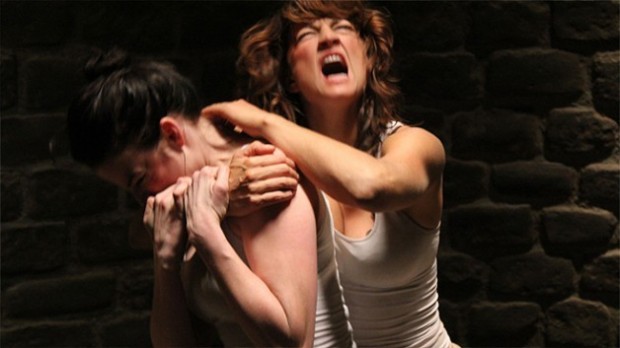
A lot of close quarter combat action sequences are getting mauled today by too many quick cuts and too many angles. It’s getting to a point where I lose track of who is fighting who and where I’m at. Can you tell when this is about to happen on set? Can you notice, “Oh, wow, that’s a lot of cameras. What are we doing that for?”
I can always tell. It’s one of the interesting things because you first saw it in the Bourne movies with that shaky cam aesthetic, up close and really tight. But the fact of the matter is that when people saw the Bourne movies, even if they were frustrated that it was up too close, they were affected the way I imagine the filmmaker wanted them to be because they did get disoriented. But if you do it right, you can get up close and personal and your audience will feel that. It’s certainly a creative decision. The truth is I know a lot of filmmakers that are shooting an action movie that say, “Let’s just shoot it wide.”
The reality is if you shoot everything too wide and too long of a shot, unless you’re shooting a movie with Tony Jaa, then you see too much. [Laughs]. But even films with Tony Jaa, you don’t want to get to the point where you’re so wide you lose the energy of it. So there’s a fine line. And I think how some movies even after the Bourne films keep doing that the audience gets more frustrated. The effect of it should be limited and now they’re like, “Hold on a minute.” We tried to get a mix of all of it in our fights. And sometimes we had fights in the same location or same situation, and we didn’t want it to feel the same. So we gave the fights a little personality. When I watched the first Bourne movie, and that started happening, I loved it. I really felt it. I was like, “Oh my God, what was that? Oh my God, that sounded painful. Did he? Did he? Ow. He’s dying!” Then after a while you’re watching too many fights across the various films and it’s like, “Come on. Now it’s not unique. It’s not surprising. Now it’s just frustrating.”
Yeah, there’s a balance.
Bell: And when they’re setting up the shots, you can never have too many cameras. [Laughs]. But there are certain angles that make the same move look ten times more powerful than some other angle even if you just do the same move exactly the same. So it’s a matter of having the knowledge of that. When it’s best to be close and best to be wide. You can tell when we’re shooting it. And I’ll be honest. You can do so much with the footage in editing. Editing is so key. You can take a fight you shot one way and edit it to be almost a different style.
You mentioned in an interview that you have this working title film called The Bali Movie.
Well, yeah, but I didn’t even call it that. He said, “Oh, The Bali Movie.” And I was like, “Wow, that’s what I was just calling it in my head.” [Laughs]
Well, you mentioned you’re writing a treatment for it. Is it nice to have some quiet time and be on a different side of film?
Well, ironically, it hasn’t been quiet for me because all of this stuff is blowing up. [Laughs]. So I’m looking forward to taking the time to be quiet and truth be told I’m not a seasoned writer by any means. I’ve written treatments for myself and talking to other people about it so I could show people, but this one, because I do want to produce it as a feature and I’m very serious about it I want to write a good treatment. It’s interesting because when I’m talking about it and jamming about it with my friends, there’s a bunch of places that have yet to be worked out. So when I go to sit down and start writing, I’ve just started asking myself the questions that I haven’t yet answered. Like I’ve got a list of questions I haven’t yet answered. So, “Until you answer those questions, Zoe, you’re not a writer.” I need some structure so I’m not just writing pages and pages in different directions. I need to pick a path. But I’ve got a lot of travel the next couple of weeks and I kind of like the idea of being trapped on the plane for twelve hours where that’s sort of my quiet time. So I’m excited to start. For me, it’s nice to have something real to base stuff on.
Well, I’m glad you mentioned that because I’m excited to see where Raze takes you.
Me too! [Laughs].
Have you sat down with any distributors yet?
Honestly, I got home at two o’clock this morning. I think two of the other boys get home today or tomorrow. And the other gets home next week. And I’m pretty much gone until the 18th of March. So sometime Monday we’re going to touch base but we need to have a sit down and debrief. Figure out where we go from here. I mean we had the premiere and everyone’s sort of burnt out at the end. It’s like, “Yay! It’s done.” But now there’s this whole other process that we’re walking into. So yeah, that’s going to be really interesting. I can’t wait to see what happens. Well, I hope I can’t wait. I hope exciting things happen. That’s what I hope.
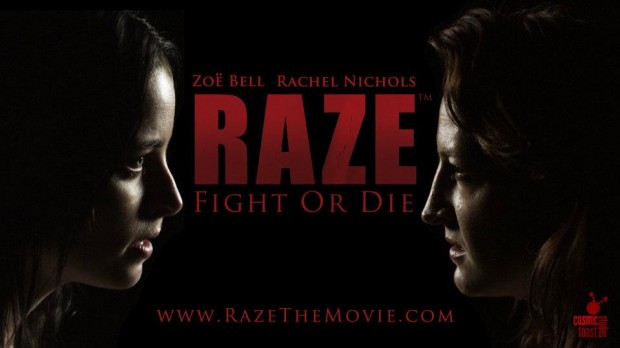
Raze premiered at Tribeca and has a final showing tonight at 11:30PM at Clearview Cinemas Chelsea 4.

